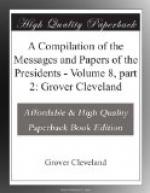The organization of the civil service of the country has for a number of years attracted more and more of the public attention. So general has become the opinion that the methods of admission to it and the conditions of remaining in it are unsound that both the great political parties have agreed in the most explicit declarations of the necessity of reform and in the most emphatic demands for it. I have fully believed these declarations and demands to be the expression of a sincere conviction of the intelligent masses of the people upon the subject, and that they should be recognized and followed by earnest and prompt action on the part of the legislative and executive departments of the Government, in pursuance of the purpose indicated.
Before my accession to office I endeavored to have my own views distinctly understood, and upon my inauguration my accord with the public opinion was stated in terms believed to be plain and unambiguous. My experience in the executive duties has strongly confirmed the belief in the great advantage the country would find in observing strictly the plan of the Constitution, which imposes upon the Executive the sole duty and responsibility of the selection of those Federal officers who by law are appointed, not elected, and which in like manner assigns to the Senate the complete right to advise and consent to or to reject the nominations so made, whilst the House of Representatives stands as the public censor of the performance of official duties, with the prerogative of investigation and prosecution in all cases of dereliction. The blemishes and imperfections in the civil service may, as I think, be traced in most cases to a practical confusion of the duties assigned to the several Departments of the Government. My purpose in this respect has been to return to the system established by the fundamental law, and to do this with the heartiest cooperation and most cordial understanding with the Senate and House of Representatives.
The practical difficulties in the selection of numerous officers for posts of widely varying responsibilities and duties are acknowledged to be very great. No system can be expected to secure absolute freedom from mistakes, and the beginning of any attempted change of custom is quite likely to be more embarrassed in this respect than any subsequent period. It is here that the Constitution seems to me to prove its claim to the great wisdom accorded to it. It gives to the Executive the assistance of the knowledge and experience of the Senate, which, when acting upon nominations as to which they may be disinterested and impartial judges, secures as strong a guaranty of freedom from errors of importance as is perhaps possible in human affairs.




